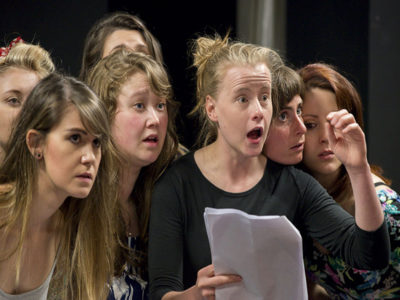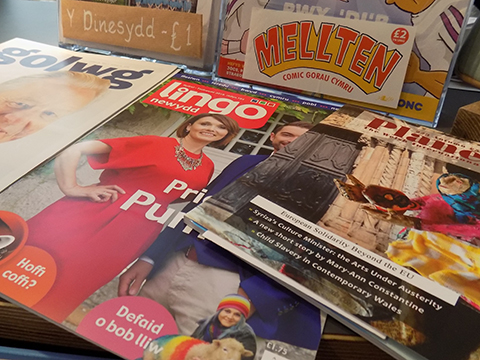[youtube width=”220″ height=”180″]http://www.youtube.com/watch?v=iRX8VUwfoIw&feature=youtu.be[/youtube]
Bethan Williams, chair of Cymdeithas yr Iaith Gymraeg, discusses the society’s past, present and future as it turns 50 years old this year.
As the Welsh language continues to lose thousands of fluent speakers a year, one 25-year-old leads the fight to keep it alive
Gwlad! Gwlad! The Millennium Stadium has sung its heart out over the past few weeks, with Welsh players and fans perfectly reciting their national anthem. However, the literal meaning behind these words probably resonates more with the bilingual fans who travelled from Colwyn Bay than those walking from Cardiff. Wales is a nation full of flag wavers, yet beneath the sea of red lies a crisis within a language that has been the heart of the country since the Middle Ages.
For Bethan Williams, the drive to keep her mother tongue from extinction is an everyday battle. As the chair of Cymdeithas yr Iaith Gymraeg (the Welsh Language Society), she spearheads a cause that has been campaigning for Welsh rights since its inception in 1962.
As the organisation celebrates its 50th anniversary this year, all eyes are on Bethan to lead a movement that has given rise to the implementation of a Welsh language TV station, radio station, and the introduction of the Welsh Language Act in 1993, as well as significant developments in bilingual education and road signs. Faced by the challenge of an apathetic nation, she announced earlier this year the group would have to change “radically” if they wanted to ensure that Welsh is a living language used day to day.
Until the mid-1800s, more than 80% of people in Wales could speak Welsh. In the early 1960s, poet, historian and political activist Saunders Lewis warned of the death of the Welsh language by the 21st century, and while things haven’t reached to that extent, in 2001 only 20% of the population claimed to be fluent speakers. Now, the numbers of deaths and people moving from the country are outpacing adult learners and children learning or raised in Welsh.
While the strong, singsong tone of Bethan’s voice is far from a revelation, you wouldn’t expect such a fresh face in charge of safeguarding one of the oldest languages in the world. It’s difficult not to be drawn to her exuberant spirit, embodied in her youthful looks; you’d be forgiven for thinking she was younger than her 25 years. Despite running a pressure group that is twice her age, she seems relatively unfazed by the task. “It’s a lot of responsibility but you’re not alone,” she says.
The Welsh television institution S4C was only in its early days when Bethan was born, following a hard-fought campaign for a Welsh language radio and television service throughout the 1970s. Brought up in Eglwyswrw, a small village in Pembrokeshire home to only 732, she still resides there today. “I’ve always lived there,” she says. “It’s a very Welsh area; the majority of what happens is through the medium of Welsh.”
Growing up, Welsh was the language of her household. “I don’t think my parents would have ever dreamt of speaking any other language with us as kids,” she recalls. Although national culture was at the forefront of her upbringing, Bethan hasn’t always set her sights on heading one of the country’s biggest campaign organisations. “I wanted to be a Welsh teacher for a long time,” she recalls. “In my mind my future was always going to be in Welsh.”
The cause she would end up dedicating herself to caught her attention through her nearby town of Cardigan. “It used to be well known as a Welsh-speaking town,” she recalls. “If you go back a couple of years, there definitely would’ve been more people speaking Welsh outside of school. You notice when you’re out on the streets you won’t hear as much Welsh, and that’s a trend that’s carried on.”
Although already a member of Cymdeithas, it wasn’t until Bethan studied at Bangor University that she developed an active role when community development officers noticed her appetite to help. After attending rallies and protests, she ran the Welsh Language Rights division where her work campaigning for the Welsh Language Measure saw her climb to the top of the group. On her way up, she gained the respect of members like Heledd Melangell, who says Bethan was instrumental in getting the law declaring Welsh an official language passed.
“Even though Bethan is chair, she’s not a boss,” she says. “Cymdeithas is a discussion with everyone. We all have equal roles and Bethan is always keen to hear everyone’s views.”
Listening to a whole host of opinions means putting herself up for public debate, and the resistance the group often encounters has made the struggle a difficult one at times. “There’s a mixed reaction everywhere you go. We constantly get that view of ‘Haven’t you got anything better to do? Go get a job and do something better with your time.’” Bethan says.
While her passions lie also with human rights and environmentalism, she says there’s a lot that needs to be done closer to home. “There’s so much on your doorstep that needs to be changed, you almost have to start off at your feet and build it up,” she explains.
Despite making huge leaps in bilingual education – Coleg Cymraeg Cenedlaethol, the first Welsh-language college was opened last year – many community schools are currently under the threat of closure. Last year, an activist from Cymeithas went without food and water for 50 hours to save a Gwynedd school because 91% of its community were Welsh speakers. “You’ve got something massive like S4C to something small like communities but it means so much to them,” she says. “There are so many different achievements that are significant to different people.”
The group’s campaigning reached new heights last September after Bethan was removed from Parliament. “Yeah, that was quite different to the Assembly,” she laughs. As the result of a vote to cut funding for Welsh language television was announced, she shouted from the public gallery, “Mae hyn yn sarhad ar bobl Cymru!” meaning “This is an insult to the people of Wales!” “There were so many people calling on Jeremy Hunt to just listen,” she says, clearly still affected. “He wasn’t meeting with anyone from Wales so it was just a feeling that we really had to do something. We do things to draw attention to the cause.”
Plaid Cymru MEP for Wales, Jill Evans, who has worked with Bethan on a number of campaigns, most notably during a campaign to save S4C where she was fined £575 for refusing to pay her TV licence, says the group’s commitment to the language is inspiring. “If it wasn’t for them, I don’t believe the Welsh language would be in the position it’s in now,” she says. “Their commitment and enthusiasm ensures that these issues are not going to go away and will remain high on the political agenda.”
As her position is voluntary, by day she works for Plaid Cymru AM Simon Thomas and by night she goes home to head one of Britain’s largest protest groups. “Campaigning is never 9 to 5,” she says. “People have day jobs so you phone people late at night, you go to meetings late at night, so it’s hard to switch off. You’re always thinking of the next step.”
The next step for Cymdeithas will see them embark on a tour of communities to mark their half-century year. For them, the biggest threat the language now faces is at a community level, after the last census showed a dramatic decline in the number of places where more than 70% of the population speak Welsh – from 92 in 1991 to 54 in 2001.
In consideration of what the next manifesto might say, she stops to recall the group’s history, and pauses in thought. “Hopefully we’ll have the next 10 years of really concentrating on communities and building them up,” she says.
As far as she’s concerned, her future is definitely with the group. “At the minute, I can’t see a time where I wouldn’t be a part of it. There’s so much to do and I think we’ve all got a contribution to make,” she says. “I know that what we do does help people in Wales in their communities and that really makes a difference. When you can see the change as well it really drives you forward.”
[youtube width=”220″ height=”180″]http://www.youtube.com/watch?v=iRX8VUwfoIw&feature=youtu.be[/youtube]
Bethan Williams, chair of Cymdeithas yr Iaith Gymraeg, discusses the society’s past, present and future as it turns 50 years old this year.




